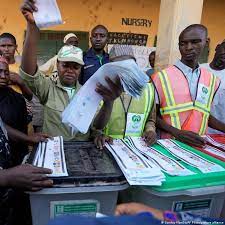Nigeria’s influence across sub-Saharan Africa is outsized.
Its population and economy are Africa’s largest; its cultural influence,symbolized by the film industry,is far reaching;and its traditional diplomatic activism, through participation in peacekeeping missions and the regional economic bloc ECOWAS, is momentous.
When Nigeria transitioned from military to civilian rule in 1999, the effects on West Africa were palpable: coups lost their legitimacy, and the region has pursued a positive democratic trajectory ever since.
But the latest presidential election is far from an example for those African countries consolidating their democracies or emerging from quasi-authoritarian regimes to emulate.
The chairman of independent National Electoral Commission, Mr Mahmood Yakubu, was sworn in for justice, credible free and fair elections.
The mission of INEC is to serve as an independent and effective election management bodies committed to the conduct of free, fair and credible elections for sustainable democracy in Nigeria.
His term will be defined by how much he’s able to improve the integrity of the country’s election system.
The Chairman of the Independent National compile and certify the electoral rolls, publish any public notice relating to elections and polls and the calling of nominations receive nominations, candidate profile statements, and required deposits, issue and receive ordinary and special votes and other official documents.
Complaints that Nigeria’s Independent National Electoral Commission can’t deliver free and fair polls have been growing louder by Nigerians
In particular, the 2019 elections came in for a heavy dose of criticism on the grounds that they were not totally free and fair.
Measures that was supposed to be considered are highlighted as follows
- The Independent National Electoral Commission hands could be build up if the National Assembly finally approves amendments to the country’s 2010 electoral act which was in objectory
- The changes, which have been put up for public debate, are designed to ensure free and fair elections outcomes also the number of polling units to reduce the distance voters have to cover and easy access to voting points and units.
- Alot of issues that he should address as a matter of urgency
- The sources for the distribution and retrieval of election materials must be well strengthened.
- He (Inec )must also improve the transparency of the collation and transmission of election results Data.
- And he (Inec)must imbibe greater use of technology, especially electronic accreditation and verification of voters.
Similarly electronic transmission of results, storage and publication of electoral data.
It is very germane that he (Inec)works with Security Operatives to reduce vote buying and provide innovative ways of reducing electoral expulsion such as the use of violence and ballot box snatching.
lnternal democracy amongst political parties should be promoted,
Expand of political parties and its implications for election logistics, ballot access and polling management must be addressed and safety precautions must be taken.
AdvertisementCreation of considerable measures to control access to the ballot by political parties as an option for managing party proliferation.
Nigeria needs to appraise the current first-past-the-post single member district system that continues to make electoral competition a winner takes all game.
Also Introducing components of proportional representation will enhance the vigour of electoral competitiveness.
The recent presidential and National Assembly elections that were held on February 25, 2023. related that were too many challenges associated with the registration of voters and issuance and collection of the permanent voter’s cards, which indeed should be the foundation of any electoral success.
Without any skepticism whatsoever, there was some form of disparity between INEC and the voters,in terms of voter education and information, especially in relation to the collection of the voter cards.
The bertillon system was unduly bureaucratic, unwieldy and discouraging.
Is this how Nigeria as a Nation continue Elections to come?

 Comments and Issues2 days ago
Comments and Issues2 days ago
 Business6 days ago
Business6 days ago
 Business1 week ago
Business1 week ago
 Business1 week ago
Business1 week ago
 Business5 days ago
Business5 days ago
 News6 days ago
News6 days ago
 Education7 days ago
Education7 days ago
 Comments and Issues5 days ago
Comments and Issues5 days ago




